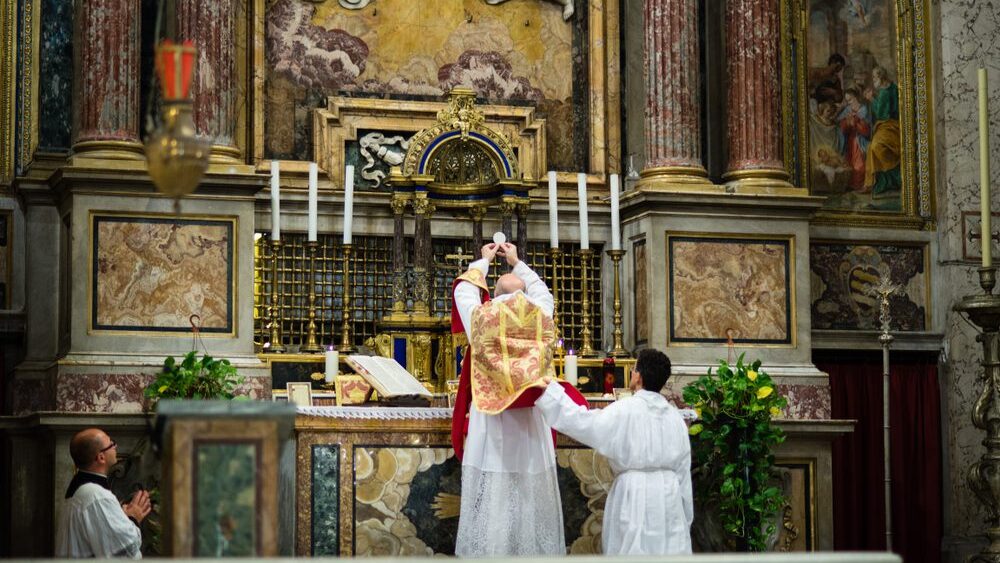
American Roman Catholicism may be undergoing a shift toward the traditional, as a survey has found that more and more young seminarian graduates are expressing traditional beliefs and that those who would describe themselves as progressive are seemingly nowhere to be found.
The results are part of a broader survey by the Catholic Project, a group based at the Catholic University of America in Washington, D.C, the Catholic News Agency reports.
The researchers released a November report that highlighted several issues, including the attitudes of newly ordained priests, stating that as many as 80% said they believed themselves to be either conservative or orthodox in their beliefs.
The trend is a marked difference from older priests, who tend to be more liberal, with the report stating:
Simply put, the portion of new priests who see themselves as politically ‘liberal’ or theologically ‘progressive’ has been steadily declining since the Second Vatican Council and has now all but vanished.
[More than half of the priests who were ordained since 2010 see themselves on the conservative side of the scale. No surveyed priests who were ordained after 2020 described themselves as ‘very progressive.’
The figures are contrasted in the report with the claim that as many as 70% of the priests who were ordained in the mid to late 1960s, just after the Second Vatican Council, thought of themselves as progressives.
The attitudes of new priests coincide with a resurgence of the pre-Vatican II Traditional Latin Mass (TLM), also known as the Tridentine Mass or the Extraordinary Form of the Mass, which is largely recited in the Latin language.
In November of last year, the New York Times highlighted the growing popularity of the TLM in America and noted that it was attracting younger Roman Catholics, particularly young families.
Surveys have also found that those who attend the TLM not only attend mass regularly but also overwhelmingly hold conservative political and pro-life views.
Of those attending the TLM, according to a survey conducted by Fr. Donald Kloster of St. Mary’s Catholic Church in Norwalk, Connecticut, 99% go to mass weekly, while just 1% approve of abortion and only 2% approve of homosexual marriage.
TLM goers were also far more likely to give more money to their church, giving at a rate around six times higher than those who attended the post-Vatican II mass, known as the Novus Ordo.
The findings also found that TLM attendee families were larger than regular Catholic families, with a birthrate of around 3.6 children per woman, a rate that dwarfs every European Union country and that of the U.S. itself.
The rise in popularity of traditional ideas and the traditional mass comes despite attempts to curtail it by Pope Francis and the Vatican, most notably by the Motu Proprio Traditiones Custodes in July 2021.
Pope Francis has also appointed several prominent progressives to high-ranking Vatican posts, such as Archbishop Victor Manuel Fernández to lead the Vatican’s Dicastery for the Doctrine of the Faith, the body formerly known as the Inquisition, which oversees matters of faith and stops the spread of false doctrine.
Pope Francis has also singled out conservatives in the U.S. church, calling them backwards-looking and stating in August, “Those American groups you talk about, so closed, are isolating themselves.”
“Instead of living by doctrine, by the true doctrine that always develops and bears fruit, they live by ideologies,” Pope Francis said and added, “If you don’t change upward, you go backward … and the effects on morality are devastating.”
The results of the Catholic Project survey also come at a time when there has been a substantial progressive push over the last year or so with the German Synodal Way, in which lay people and members of the German clergy voted in favour of several progressive ideas.
Among them was the approval of the blessing of same-sex couples, a call for priestly celibacy to be optional, and a demand for the Vatican to open the ability to become a deacon to women.
The Vatican, however, rejected the authority of the Synodal Path to make any broad and radical changes.
Some have argued that the hegemony of progressives in the church has led to not only a decline in regular mass attendance, which has slumped greatly since the 1960s in America, but also that seemingly few Catholics actually believe in the cornerstone doctrines of the Faith.
A 2019 Pew Research study found that only a third of U.S. Catholics
overall believe that Jesus Christ is fully present in the Eucharist,
meaning that the bread and wine are physically transformed into his
literal body, blood, and divinity through the process of
transubstantiation during the mass.
